
MacGregor Campbell
On The Road is "Think Out Loud’s" radio road trip series: conversations with wanderers, tourists and residents along Oregon’s back roads and highways.
Stop One: Fruitland
Our first stop is Jolts and Juice Coffee Company, which has a row of cars lining up at its drive-thru window. Inside, baristas are quickly pulling shots of espresso and running credit cards.
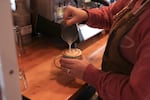
Jordan Heinz pours a latte at the Jolts and Juice Coffee Company.
Dave Blanchard / OPB
At a table in the middle of the café, Dwayne Holloway is catching up with his friends Rick Hardisty and Stu Edwards.
"I'm retired and they're still working," Holloway says with a laugh. "We get together every day of the week and just have a cup of coffee."
They catch up on each other's lives and jobs, and today they're talking about weekend plans. Holloway is going to be one of the thousands of people across the West heading to Jordan Valley for a rodeo. And he's bringing his grandson.
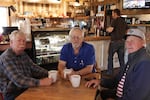
Mark Hardesty, Stu Edwards, and Dwayne Holloway get together at Jolts and Juice Coffee Company most days.
Dave Blanchard / OPB
"He's really a rodeo and a cowboy boy — he was raised that way so far, so he enjoys that stuff," Holloway says.
Stop Two: Outside Parma
We continue on down U.S. Route 95, away from the city center towards the farmland that dominates much of the Treasure Valley around Boise, Idaho. We spot Dan Russell taking a stroll with his wife and dogs.
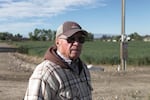
Dan Russell bought a 15-acre farm for his retirement.
Dave Blanchard / OPB
Russell used to work in air quality management in Los Angeles. When he retired, he decided to come back to the area where he grew up. But rather than downsize, he bought a 15-acre farm to try his hand growing wheat.
On this day he'll be fertilizing, spreading compost and tending the 300 trees in his family's apple orchard. He knows that kind of work isn't most people's idea of a relaxing retirement, but it suits him.
"I like to work," Russell says. "I don't like to sit on the couch."
Stop Three: Treasure Valley Overlook
We travel further along U.S. 95, passing more farmland. Hops are a booming industry here in Canyon County, Idaho, and the farms have row upon row of 20-foot-tall arbors for the vines to grow up.
South of the small town of Marsing, Idaho, farmland gives way to hills, and we begin to climb. The highway passes through road cuts of old volcanic rock.
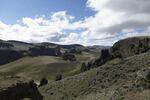
Much of the rock in the Owyhee Canyonlands is rhyolite from ancient volcanic activity.
Dave Blanchard / OPB
We pull over at a small turnout on the highway. We’re here to meet Sammy Castonguay, an earth systems science instructor at Treasure Valley Community College. He tells us there’s a small trail here to a gorgeous viewpoint. There's rugged, ragged volcanic rock, covered in a gentle blanket of green.
Castonguay tells us what it is in geological terms — the Jump Creek rhyolite.
"I like the pancake batter analogy — [rhyolite] flows very thick ... when they're erupting out of the crust they're very slow and very viscous as they come out," he says. "And what we're standing on is a pile of at least 300-feet-thick rhyolite."
That's the geology that defines most of the famous Owyhee Canyonlands — a wilderness area that draws climbers, rafters, hunters and other recreationists.
Castonguay says deserts like this are underappreciated.
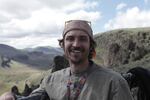
Sammy Castonguay is an earth systems science instructor at Treasure Valley Community College.
Dave Blanchard / OPB
As opposed to forested landscapes with giant trees and lots of visible life, "in the desert life is hard," he says, "you need to sort of seek out the individuals and the organisms of life" — the kinds of things Castonguay refers to as "hidden biota."
"I think there's a lot more personal appreciation that you have to have for the desert," he says, "because it's really hard to make a connection unless you're out there for a long period of time ... You really do have to spend more time feeling the landscape than sort of seeing the landscape."
Stop Four: The Hanley Ranch
Further down the road sits Jordan Valley, Oregon — a small town built on ranching. We stop at Mike Hanley’s house on the outskirts of town.

Mike Hanley builds and refurbishes old wagons.
Dave Blanchard / OPB
Hanley has a passion for old wagons. He walks us through a shop on his property, filled with 20 or so wagons that he’s refurbished. Some are covered in canvas, some are open-air, some are entirely enclosed in wood. There are humble wagons made of raw wood and showboat wagons painted in bright colors.
He also has a number of old buildings on his ranch, one of which he moved from downtown Jordan Valley after it was supposed to be demolished.
He thinks by preserving old wagons and buildings, he’s preserving history. We ask if his children and grandchildren care as much about historic preservation as he does.
"Young people anymore aren't really as close to history as I and my neighbors were because we grew up with it," Hanley says. "But the electronic age has really changed everybody's focus. People are more people of the world, and we were people of the community. There's a difference.
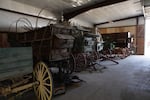
Mike Handley's wagons are kept in a barn on his ranch.
Dave Blanchard / OPB
"If you take a look through rural America, we're suffering a decline in our populations — people are moving to the cities ... but more and more we're finding out the rural lifestyle is probably what America's all about, and I think retaining our history is vital ... we have a culture we're pretty proud of here in the West, and we want to maintain it because that's who we are."
Stop Five: Big Loop Rodeo Grounds
The whole town is getting ready for its annual Big Loop Rodeo while we're visiting. The rodeo is famous for its authenticity.
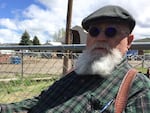
Mike "Fluff" Wood is a silversmith.
Dave Blanchard / OPB
Mike Wood is known as "Fluff" by the other vendors here. He's a silversmith, and he explains the appeal of this rodeo.
"This is about as Western as it gets, right here," Wood says. "You've got some of the best saddle makers, silversmiths, rawhide braiders. If it has anything to do with the horse, you can usually find it here.

Mike "Fluff" Wood's style incorporates floral patterns.
Dave Blanchard / OPB
"The cowboys and buckaroos that are rodeo-ing here, they're the real deal. They're not just cowboy athletes, these guys are out here working, living the life day-in-day-out."
Tracy Sue Bruce has been to the Big Loop Rodeo every year for 24 years. She's from Albany, Oregon, originally, but moved to Idaho. She has a one-word answer for why she felt she had to move east of the Cascades:
"Democrats."
Idaho suits her.
"We like to kill, clean, cut and wrap our stuff," she explains. "We like guns.
"It's like a big family reunion to people you're not related to, so it's even more fun sometimes than actual family reunions."
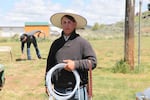
Ray Baird prepares to compete in the Big Loop Rodeo in Jordan Valley.
Dave Blanchard / OPB
Bruce's son, Ray Baird, is with her. He’ll be riding a bronc in the rodeo this weekend.
"Everything goes into slow motion — it's like smoking a good bowl," he says of the experience.
Even though most rides last only a couple of seconds, "it lasts five minutes it feels like. You can watch things come together and you can think and see things coming up ahead of time."
Stop Six: Jordan Valley City Park
Jordan Valley is also on a major highway, so a lot of people stop here on road trips.
Ric Seaberg and Marie Deatherage are eating lunch in the Jordon Valley City Park. Seaberg moved to Portland when he was very young, while Deatherage grew up in Oregon. She was a geography teacher and led field trips throughout the state. Now that they’re both retired, she’s showing Seaberg more of the state.
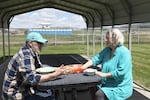
Ric Seaberg and Marie Deatherage eat lunch at a park in Jordan Valley.
Dave Blanchard / OPB
"I'm always telling Ric about these fantastic places in Oregon," she says. "It's like the most diverse state of all, and so I have to plan these little trips and take him to various places he's never seen."
The two have been together since 1997, a fact that surprises Deatherage when she says it out loud, and she let's out an "ooh" of surprise.
"It's amazing that it's been 20 years," she says, "because it seems like we met late in life, and we're still alive!"
Stop Seven: Flat Iron Steakhouse
The Flat Iron Steakhouse is filled with cowboys on the eve of the rodeo. Rancher Mark Fillmore hangs out with a group of men on the front porch while children play in the grassy yard. His wife runs the restaurant.
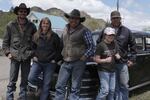
Mark Fillmore (center) hangs out with some friends the day before the Big Loop Rodeo begins in Jordan Valley.
Dave Blanchard / OPB
He relates a story to the guys about his struggles to quit chewing tobacco.
"I'm 51 and I'll guarantee you I was chewing at 11," he says. One consequence of trying to quit: He's got a much shorter temper.
As an example, Fillmore says his doctor recently told him he was obese, which made him snap.
"He was a pretty thin man, and I just told him, ' Well I could just break you in two and eat you right now,'" Fillmore says.
So now he's sticking with gum, "and I hate it ... You would think with all the technology we got today, we could come up with some healthy tobacco because it is quite savory."
Stop Eight: Danner
We meet Bob Skinner in the little community of Danner, Oregon. He just got a new border collie — the preferred dog breed for many ranchers — two weeks ago. He named him Latch.
Latch isn't fully trained yet and keeps jumping out of the truck bed. "He doesn't know anything," Skinner says.
Once he's grown, though, he'll be indispensable to Skinner.
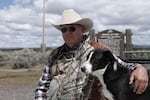
Bob Skinner is a rancher near the small community of Danner, Oregon.
Dave Blanchard / OPB
A good ranch dog is "just like having about five people," he says. "If you're in the trees, [dogs] can find [cattle] and we can't. They can travel fast, a good one can handle cattle better than people. They can make them mind, and we can't because they can bite ... they're really valuable to us"
Stop Nine: Rome
Thirty miles west of Jordan Valley is tiny Rome, Oregon. It’s basically just a restaurant, a gas station and a put-in for rafters hoping to run the Owyhee River.

Rome serves as a starting point for many people rafting on the Owyhee River.
Dave Blanchard / OPB
Most of the year, the Owyhee isn’t raftable. But this spring, the conditions are ideal and there are dozens of vans and cars at the put-in when we get there.
Rose Wallick and Regan Dunn are getting ready for a trip with their families. They met around 20 years ago as raft guides in Colorado.
Now they live across the U.S. — Wallick in Portland, Oregon; Dunn in Chicago; another friend in Reno, Nevada — but they got the chance to meet up here for a rafting reunion.
And this time, they'll be rafting with their kids. Wallick says that will make things slightly different from their trips in their 20s.
"A little more responsibility, a little less wild," she says, "but I think it will still be really fun and really rich in other ways to have our kids along."
They're both scientists, and Wallick says that makes parenting a lot of fun.
"It's an amazing treat to be a science mom," she says, "and my little guy is so curious ... He loves it all, he asks a ton of questions, and it's so fun to just support that and see him blossom as a little scientist."
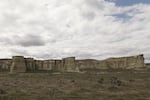
The Pillars of Rome are a few miles outside the tiny community of Rome, Oregon.
Dave Blanchard / OPB
Stop 10: Mecate Maker
A little ways from Rome, Oregon, several miles down a long gravel road — and 4 miles from the nearest neighbor — is Helen Dougal Corbari's home.
She makes mecates (pronounced "McCarties") — a Spanish style horse hair rein — that are twisted together.
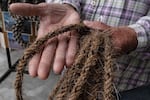
Helen Dougal Corbari holds one of her mecates.
Dave Blanchard / OPB
She comes from a long line of mecate makers, including her mom and grandmother. Her daughter has gotten into the tradition too, but with a spin.
"She adds color to them," Corbari explains with an inscrutable frown. "She takes the white and dyes them, so she puts pinks and turquoise and blues, oranges [in them]."
Corbari may not want to go to those extremes herself, but she sees an advantage to her daughter bucking tradition.
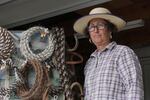
Helen Dougal Corbari makes mecates.
Dave Blanchard / OPB
"I think it's awesome because she has a whole different market than I do," she says.
That economic pragmatism doesn't extend to the whole family, though.
"My mom doesn't really like the dyed ones ... she's 99, so it's kind of hard to change her ideas," Corbari says.
OPB’s "Oregon Field Guide" profiled Corbari’s mom, Frankie Dugal, in 2016:
Stop 11: McDermitt Rock Shop
Stradling the Oregon-Nevada border is the small town of McDermitt.
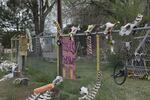
Joe Van Eeten owns a rock shop in McDermitt.
Dave Blanchard / OPB
When we pull into town, we meet several members of the Central Oregon Rock Collectors club at a rock shop run by Joe "White Eagle" Van Eeten.
They had just come back from hunting for agates and opalized, petrified wood — treasures that this area is famous for.
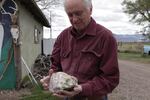
John Moreau holds a rock he just purchased.
Dave Blanchard / OPB
John Moreau brings back a rock from Van Eeten: "I saw it earlier today, and you know when you want it, because it gets in your hand and you can't put it back down, you know?"
Ken Lawson made his living working with rocks. Now, in his retirement, he's still obsessed.
"It's in my blood, man," Lawson says. "I'm a third-generation stonemason and so I just have no choice."
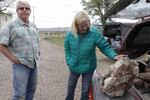
Ken Lawson and Suzie Meeker are members of the Central Oregon Rock Collectors club.
Dave Blanchard / OPB
Stop 12: White Horse Inn
Van Eeten is a veteran from the Vietnam War who is trying to find a way to turn the old White Horse Inn in town into a veterans retreat.
He himself had a hard time adjusting to life as a civilian.
"I had a difficult time getting along with people," Van Eeten says. "I had a difficult time to stay married, you know? You're in this war mode, with a lot of bad nightmares and flashbacks."
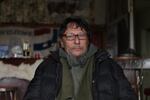
Joe Van Eeten owns the White Horse Inn in McDermitt.
Dave Blanchard / OPB
In the '90s, he started a retreat in the Oregon Coast Range called Base Camp Bravo. It was a place veterans could share experiences with each other and access benefits. But it was shut down over land use issues.
Van Eeten eventually resettled in McDermitt, where he bought the White Horse, in hopes of revitalizing the idea of Base Camp Bravo.
"I put everything into it that I got," he says, but he hasn't yet been able to realize his dream.
"I redid the basement. I put in new walls, new roof, new windows, and I just ran out of money," he says. "If I had another $100,000, I could put new plumbing, new electrical ... new bathrooms and all that stuff."
He still hopes he can find investors to see Base Camp Bravo live again.
Stop 13: Fort McDermitt Indian Reservation
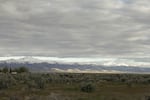
Dennis Smartt's backyard looks onto the Santa Rosa Mountains in Nevada.
Dave Blanchard / OPB
"Now we are divided seems like to me," 71-year-old Dennis Smartt tells us at his home on the Fort McDermitt Indian Reservation. "People used to visit each other many years ago."
Smartt is part of a push to host storytelling events on the reservation. They had their first event last year, and there was a good turnout and a lot of enthusiasm for the project. He thinks it's a good way to bring the community together and get in touch with tradition.
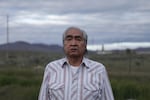
Dennis Smartt lives on the Fort McDermitt Indian Reservation.
Dave Blanchard / OPB
"I used to go to school, here in McDermitt, talk to the kids, tell them coyote legends or sing them a song, and seems like they enjoyed it," Smartt says.
The storytelling project is a way for others to share their experiences, and he hopes the community outside the reservation takes part.
"Maybe if I do this," he says, "I'll maybe open the door to the whole world where they might see what kind of life we are living — the people that originally owned this United States from North Pole to South Pole, you know?"
Smart’s next storytelling event will take place in early August.
Stop 14: Say When Casino
Sean and Leigh Ann Dufurrena run the 24-hour Say When Casino in McDermitt. They took it over from Sean's mom a few years back, which meant they had to move from Boise, Idaho, to tiny McDermitt to run the place.
"I've always kind of been one for an adventure," Leigh Ann says.
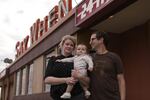
Leigh Ann and Sean Dufurrena run the Say When Casino in McDermitt.
Dave Blanchard / OPB
Sean’s grandma first opened the casino decades ago and he spent a lot of time here as a kid in McDermitt. "I grew up mainly searching for quarters behind slot machines and stuff like that when I was a little kid," he said.
It was a very different town then.
"The town was a heck of a lot busier," he says of those days. A mercury mine in town was still in business, and the casino was a much grander operation.
When the Dufurrenas took over, they had plans to bring the casino back to its glory days.
"I came down with sort of this romantic vision that it would be more of a destination type place for music and things like that," Leigh Ann says.
But reality set in when they arrived. "The day-to-day just kind of keeps us so busy," Sean says.
On the other side of the casino, sitting at the bar, is a couple in a very different stage of their life. Steven Heitmann is a ranch hand on a farm down in Orovada, Nevada — about 30 miles south.
He and Brie Nidey are grabbing dinner at the casino, since the meal options are fairly limited in Orovada.
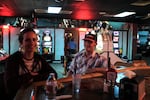
Brie Nidey and Steven Heitmann live in Orovada and recently got engaged.
Dave Blanchard / OPB
They're both from Colorado, but Heitmann found work on a ranch here, so they're here for a few months, "basically living the American cowboy dream, you know?"
"I just proposed to her last week," Heitmann tells us.
"It was very romantic and cute," Nidey says, "He took me out to the middle of nowhere, like literally the middle of nowhere, nothing was out there, it was out on the ranch ... I was really confused at first, and then he set me up and turned me around and proposed to me, and it was just magical, it was awesome."
Heitmann is 22 and Nidley is 21.
When Nidley looks to her future, she says she wants "just to live a happy and full life and say, 'Oh yeah, I did that,' and whenever I'm old I want to have fun stories that I can tell my grandkids, you know? I don't want it to just be one place, you know, boring life. I want to go see the world and make mistakes and have a wonderful time doing it."
Editor's note: This story has been updated to reflect the correct spelling of Mike Hanley's name. OPB regrets the error.